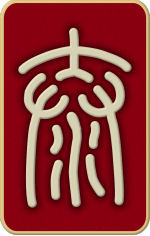
泰 Tài Progress (Interplay) [hexagram 11]


Earth over Heaven
 Earth element
Earth element
Lunar month: 1 ; Host (controlling) line : 2
The Decision
The small depart, the great arrive. Success and fulfillment.
‘The small depart, the great arrive. Success and fulfillment’ – heaven and earth are in harmony. The inner is strong while the outer is divided. Inner strength and outer calm. Inner dominates the outer. Inner strength overwhelms outer weakness.
泰: 小往大来, 吉亨. Tài: xiǎo wǎng dà lái, jí hēng.
彖传: 泰, 小往大来, 吉亨. 则是天地交, 而万物通也; 上下交, 而其志同也. 内阳而外阴, 内健而外顺, 内君子而外小人, 君子道长, 小人道消也. Tuàn zhuàn: Tài, xiǎo wǎng dà lái, jí hēng. Zé shì tiān dì jiāo, ér wàn wù tōng yě; shàng xià jiāo, ér qí zhì tóng yě. nèi yáng ér wài yīn, nèi jiàn ér wài shùn, nèi jūn zǐ ér wài xiǎo rén, jūn zǐ dào zhǎng, xiǎo rén dào xiāo yě.
The Image
Heaven and earth move as one, with this in mind the wise follow the way of heaven and earth, bringing benefit to others.
象传: 天地交泰, 后以财成天地之道, 辅相天地之宜, 以左右民. Xiàng zhuàn: Tiān dì jiāo tài, hòu yǐ cái chéng tiān dì zhī dào, fǔ xiàngtiān dì zhī yí, yǐ zuǒ yòu mín.
Line Change 1
By pulling up one grass stalk, others come up with it. Moving forward brings success.
‘Pulling up one grass stalk brings success’ – setting plans in motion.
初九: 拔茅茹, 以其汇, 征吉. Chū jiǔ: bá máo rú, yǐ qí huì, zhēng jí.
象传: 拔茅征吉, 志在外也. Xiàng zhuàn: Bá máo zhēng jí, zhì zài wài yě.
Line Change 2
Tolerating the wilderness and fording the river but not neglecting one’s own objective. Taking the middle path earns reward.
‘Tolerating the wilderness and taking the middle path earns reward’ – both intelligent and capable.
九二: 包荒, 用冯河, 不遐遗, 朋亡, 得尚于中行. Jiǔ èr: bāo huāng, yòng píng hé, bù xiá yí, péng wáng, dé shàng yú zhōng háng.
象传: 包荒, 得尚于中行, 以光大也. Xiàng zhuàn: Bāo huāng, dé shàng yú zhōng háng, yǐ guāng dà yě.
Line Change 3
Hills must follow on from level ground. There is no setting out without a return. Despite danger, perseverance is not an error; it is not a cause for anxiety. Savor the current happiness.
‘There is no setting out without a return’ – this is an eternal truth.
九三: 无平不陂, 无往不复, 艰贞无咎. 勿恤其孚, 于食有福. Jiǔ sān: wú píng bù bēi, wú wǎng bù fù, jiān zhēn wú jiù. wù xù qí fú, yú shí yǒu fú.
象传: 无往不复, 天地际也. Xiàng zhuàn: Wú wǎng bù fù, tiān dì jì yě.
Line Change 4
Fluttering downwards, relying on others. Their aid is sincere.
‘Fluttering downwards, relying on others’ – the situation is not ideal. ‘Their aid is sincere’ – they wish to help.
六四: 翩翩, 不富, 以其邻, 不戒以孚. Liù sì: piān piān, bù fù, yǐ qí lín, bù jiè yǐ fú.
象传: 翩翩不富, 皆失实也. 不戒以孚, 中心愿也. Xiàng zhuàn: Piān piān bù fù, jiē shī shí yě. bù jiè yǐ fú, zhōng xīn yuàn yě.
Line Change 5
A harmonious marriage on generous terms. This is the way to great happiness and good luck.
‘This is the way to great happiness and good luck’ – a middle way brings fulfillment to wishes.
六五: 帝乙归妹, 以祉元吉. Liù wǔ: dì yǐ guī mèi, yǐ zhǐ yuán jí.
象传: 以祉元吉, 中以行也. Xiàng zhuàn: Yǐ zhǐ yuán jí, zhōngyǐ xíng yě.
Line Change 6
The outer defense collapses. Useless to call in all your friends. Issuing commands to neighbors, however well intentioned, will bring regret.
‘The outer defense collapses’ – things have been neglected for too long.
上六: 城复于隍, 勿用师. 自邑告命, 贞吝. Shàng liù: chéng fù yú huáng, wù yòng shī. Zì yì gào mìng, zhēn lìn.
象传: 城复于隍, 其命乱也. Xiàng zhuàn: Chéng fù yú huáng, qí mìng luàn yě.
The full set of 64 English translations is available in our new book 'Book of Changes - Deciphered' ➚.